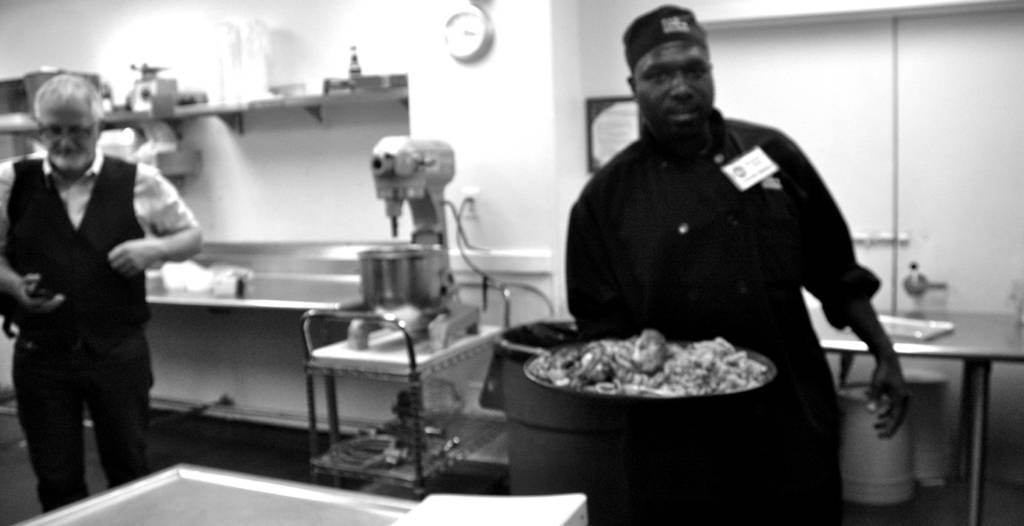Freddie Smith was determined to stay free.
Newly released from a prison sentence in D.C. in 2008, he had been in and out of jail since he was 13 years old. But this time was different; this time he had shown huge gains in stabilizing his life, having spent months in a drug rehabilitation center. Then the judge demanded 90 days in a halfway house—standard for ex-offenders in the District.
“The only thing I could do was go to work,” said Smith. But finding work was difficult, especially since
employers are often wary to hire exoffenders. Then he remembered how a friend back at his rehab center had recommended he apply to a place called DC Central Kitchen, which, he was told, trained at-risk individuals such as ex-offenders and victims of substance abuse—in his case, he was both—in professional culinary skills. The organization then linked participants to jobs in commercial kitchens around D.C. with a nearly perfect placement record.
Smith quickly applied to the program and was soon accepted. Three years later, having successfully completed the program, he is now a staff member at DC Central Kitchen. Yet D.C. has few organizations like DC Central Kitchen—that is, programs that not only offer transitional outreach services to ex-offenders, but also train them in useful job skills.
Efforts DC, an organization that specializes in providing ex-offenders with general “re-entry” tools, offers mostly counseling, drug education and life skills workshops.
For its part, DC Central Kitchen offers participating students—many of whom enter the program with a previous interest or background in cooking—free books, a transportation stipend and two meals a day. It also links them to various transitional programs, including transitional housing shelters and pre-trial services, and eventually to a job in one of D.C.’s commercial kitchens, with the hope of stabilizing their day-today lives.
As Marianne Ali, the organization’s director of job training, explains, ensuring that ex-offenders are able to return to their normal lives requires diverse efforts on the part of relief groups, families and even the government.
One of the major challenges facing ex-offenders newly released from prison, says Ali, is the difficulty of finding work, particularly since the economy has worsened in the last few years and competition for low-wage jobs has increased.
“The biggest thing is the idea that that folks just don’t hire felons,” said Ali.
DC Central Kitchen’s CEO, Michael Curtin, agreed. He added that as the pile of applications facing employers increases, ex-offenders are often ignored entirely.
“A lot of the highly skilled professionals that have lost jobs are looking for new jobs,” he said, “and an easy way to decrease that pile [of applications] is to eliminate ex-offenders.”
Fortunately, as Curtin explains, DC Central Kitchen has established close ties with many employers in the District, ensuring that its students will almost certainly find employment, often as a line cook.
But for those ex-offenders outside the program, the future may appear bleak. Between January 2008 and December 2011, unemployment in DC rose 4.5%, according to the U.S. Bureau of Labor Statistics.
Making the post-prison transition even more difficult, ex-offenders also face a national shortage of affordable housing. For every 100 low-income renter households, only 30 rental homes are available nation-wide, according to a recent study published by the National Low-Income Housing Coalition (NLIHC).
And in Washington, D.C., where the gap between the city’s highest and lowest earners is higher than
almost any other major city in the country, the shortage is especially acute. D.C.’s low-cost rental supply has diminished by more than a third since 2000, according to Census Bureau data.
“The biggest thing is the idea that folks just don’t hire felons.”
Students at DC Central Kitchen are by no means immune to the affordable housing crisis. Ali noted that until three years ago, several students in each class, unable to find housing after leaving their halfway house, were forced to drop out of the program.
To address the problem, the organization quickly developed a protocol By Anna Salinas Editorial Intern for connecting students with affordable transitional and permanent housing, expanding its outreach team and teaming up with the Federal Housing Administration. Students were placed according to their level of risk, with addiction and past offenses each playing a role. Many were placed in D.C.’s Oxford Houses, a network of homes aimed at aiding those suffering from drug and alcohol addiction.
The solution is far from perfect, adds Moore, due to increasing demand for affordable housing.
“There’s just not enough housing,” she said.
Nevertheless, DC Central Kitchen has managed to graduate over 300 students in the last three years alone.
Less than a year after Freddie Smith first enrolled as a student at DC Central Kitchen, having already been hired as a staff member, he met a female student and soon found himself in love.
“I couldn’t stop looking at her,” he said, adding that he eventually asked her out on a date. The pair stayed together, even after the woman graduated and found work outside of DC Central Kitchen. Then in February of this year, the two wed.
Smith had come a long way since 2008, a fact about which he was proud, but he added that even with his desire to remain free and stable, he had been fortunate. He wishes he could thank the friend who originally told him about DC Central Kitchen but he has disappeared. Smith hopes he has not relapsed into drugs or other trouble.
“I think about my friend,” said Smith. “I don’t know what happened to him.”







